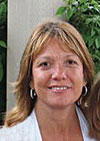
Editorial
The nature of language
By Kathy VanLoon
June 2007
Return to Table of Contents
Print Article
By the year 2100, Scarboro missioner Fr. Ron MacDonell writes in this edition of Scarboro Missions, 90 percent of the world's 5,000 languages will die and there will be only 500 languages spoken. For Fr. Ron, this is a great cultural and human loss, as each cultural expression is a "unique and mysterious manifestation of God's creation."
Fr. Ron is passionate about linguistics and his passion cannot be contained. A couple of years ago he suggested that we do a magazine issue on language and sent me an outline of possible story ideas. It took a while to pull everything together, but we finally accomplished the task. In the process, I gained a new and wider appreciation of the meaning of language.
Working on this issue, I also began to think about the many specialized languages that exist. We've all heard such terms as "shop talk" and "baby talk". And there are many more. Some, such as sign language, do not even involve the spoken word.
Have you ever thought of silence as a language? Oblate Father Ron Rolheiser and Scarboro facilitator Sharon Willan both write about silence as the language of God. Through silence we make the awe-inspiring journey to the very heart of Holy Mystery.
From this encounter with the Compassionate One, we learn to be compassionate and loving.
Holy Mystery and Compassionate One are just two of the many names and images used to describe God. In her article, Franciscan Sister Karen Lueck writes about the wealth of language that attempts to embrace the One who is beyond all names.
And what of the interfaith conversation? Scarboro interfaith consultant Larry (J.W.) Windland defines for us a type of "mindful language" that builds relationships of respect and trust between people of different faith traditions.
Dr. Barbara Landau and Shahid Akhtar, co-founders of the Canadian Association of Jews and Muslims, present the languages of diplomacy and conflict resolution. These languages are used to create peace in our conflict-ridden world. Above all, say the authors, these must be languages of respect, mindful of the hurts and pains, rights and freedoms of others.
Fr. Jack Lynch writes about the language of Pentecost. He says that Pentecost invites us to look for the Spirit of God in every human heart and to see how hearts are touched and moved by the actions of others.
Scarboro missioners know much about the joys and challenges of learning a new language in mission. Nearly all those who served overseas have been humbled by the childlike experience of not understanding what is being said and not knowing how to express themselves in the most basic ways. However, as Fr. Gerald Curry writes, "Equally important as the language was our attitude towards the people and their culture...This 'language of the heart' was more important to them than any linguistic fluency we may have attained."
And in praise of meaningful communication, Sufi poet Jelalludin Rumi writes, "Enough of phrases and conceits and metaphors! I want burning, burning...Light up a fire of love in thy soul, Burn all thought and expression away!"
I close with the words of St. Benedict who asks what can be sweeter than the voice of God inviting us into relationship and fullness of life? "If thou wilt have true and everlasting life, keep thy tongue from evil, and thy lips from speaking guile; turn away from evil and do good; seek after peace and pursue it (Psalm 33:14-15). And when you shall have done these things, my eyes shall be upon you, and my ears unto your prayers. And before you shall call upon me I will say: 'Behold, I am here'" (Isaiah 58:9).
Return to Table of Contents
Print Article